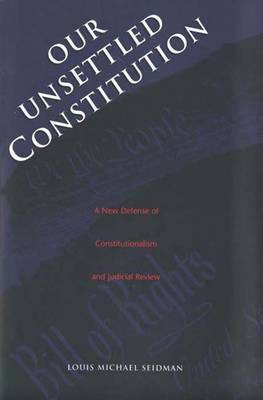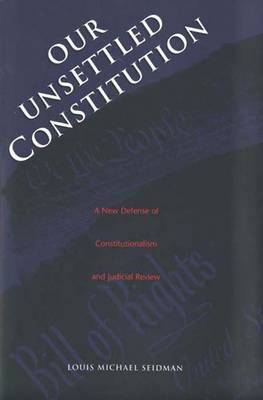
- Retrait gratuit dans votre magasin Club
- 7.000.000 titres dans notre catalogue
- Payer en toute sécurité
- Toujours un magasin près de chez vous
- Retrait gratuit dans votre magasin Club
- 7.000.0000 titres dans notre catalogue
- Payer en toute sécurité
- Toujours un magasin près de chez vous
Our Unsettled Constitution
A New Defense of Constitutionalism and Judicial Review
Louis Michael Seidman
Livre relié | Anglais
123,95 €
+ 247 points
Description
Ours is an age of growing doubt about constitutional theory and of outright hostility to any theory that defends judicial review. Why should a tiny number of unelected judges be able to validate or invalidate laws on such politically controversial issues as abortion, religion, gender, and sex--or even determine how the president is elected? In this provocative book, a leading constitutional theorist offers an entirely original defense of judicial review. Louis Michael Seidman argues that judicial review is defensible if we set aside common but erroneous assumptions--that constitutional law should be independent from our political commitments and that the role of constitutional law is to settle political disagreement. Seidman develops a theory of "unsettlement." A constitution that unsettles, that destabilizes outcomes produced by the political process, creates no permanent losers nursing deep-seated grievances, he says. An "unsettling" constitution helps to build a community founded on consent by enticing losers into a continuing conversation. The author applies this theory to an array of well-known cases heard by the Supreme Court over the past several decades, including the fall 2000 election decision.
Spécifications
Parties prenantes
- Auteur(s) :
- Editeur:
Contenu
- Nombre de pages :
- 272
- Langue:
- Anglais
Caractéristiques
- EAN:
- 9780300085310
- Date de parution :
- 11-12-01
- Format:
- Livre relié
- Format numérique:
- Genaaid
- Dimensions :
- 161 mm x 246 mm
- Poids :
- 526 g

Les avis
Nous publions uniquement les avis qui respectent les conditions requises. Consultez nos conditions pour les avis.






